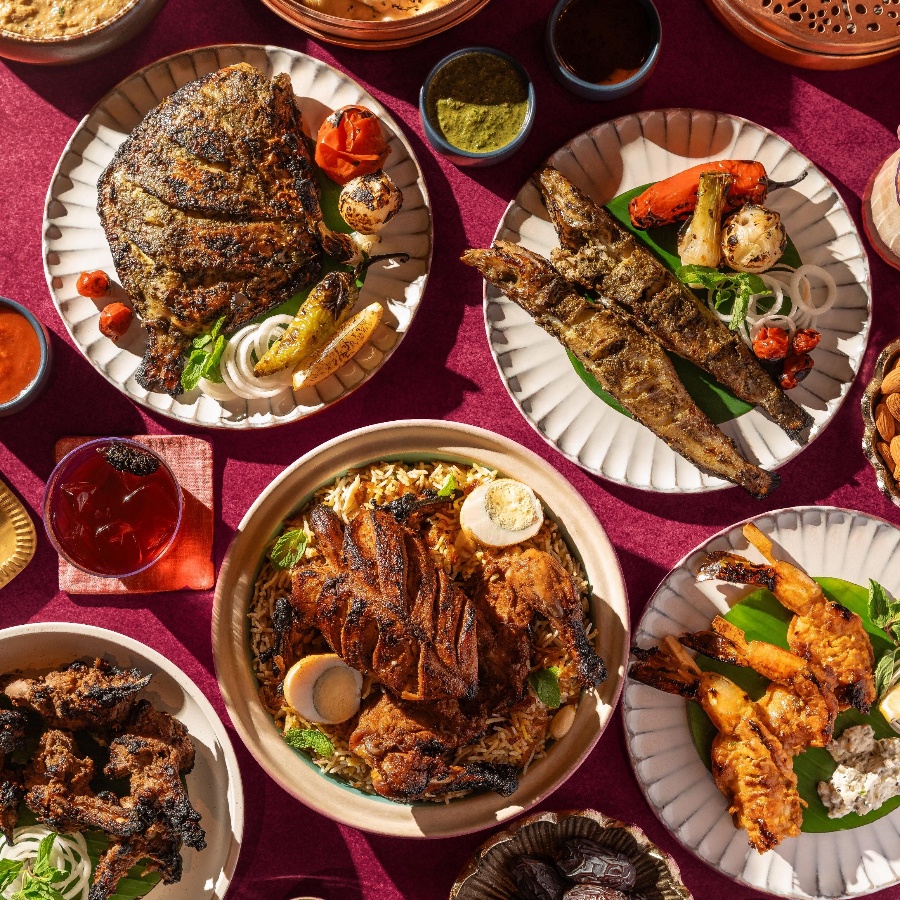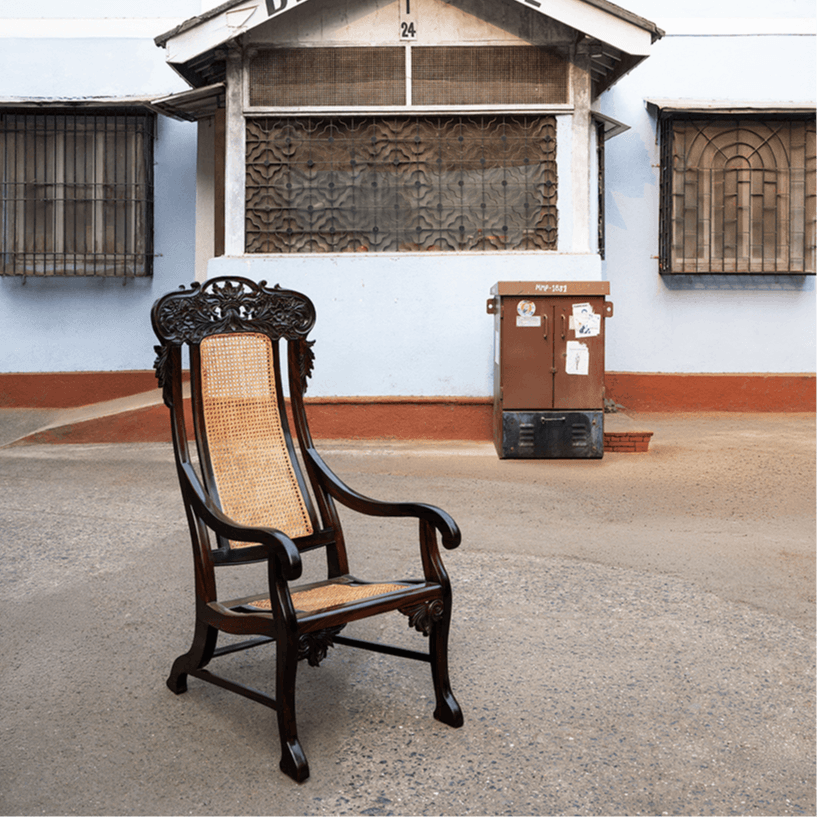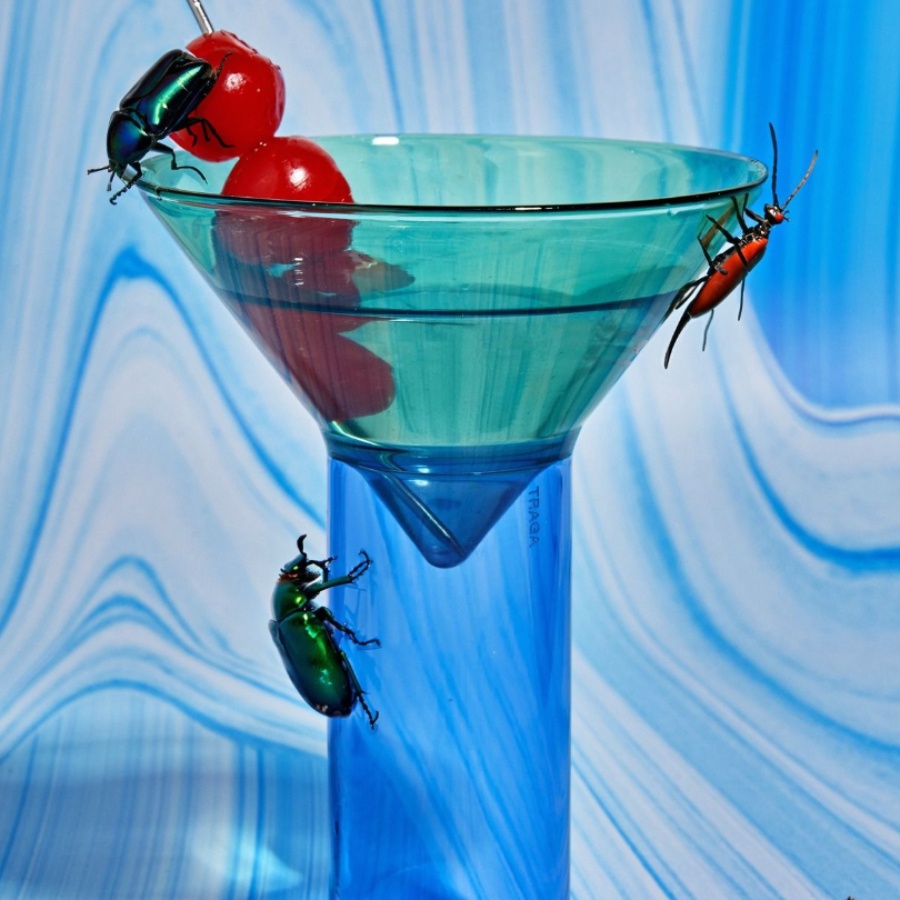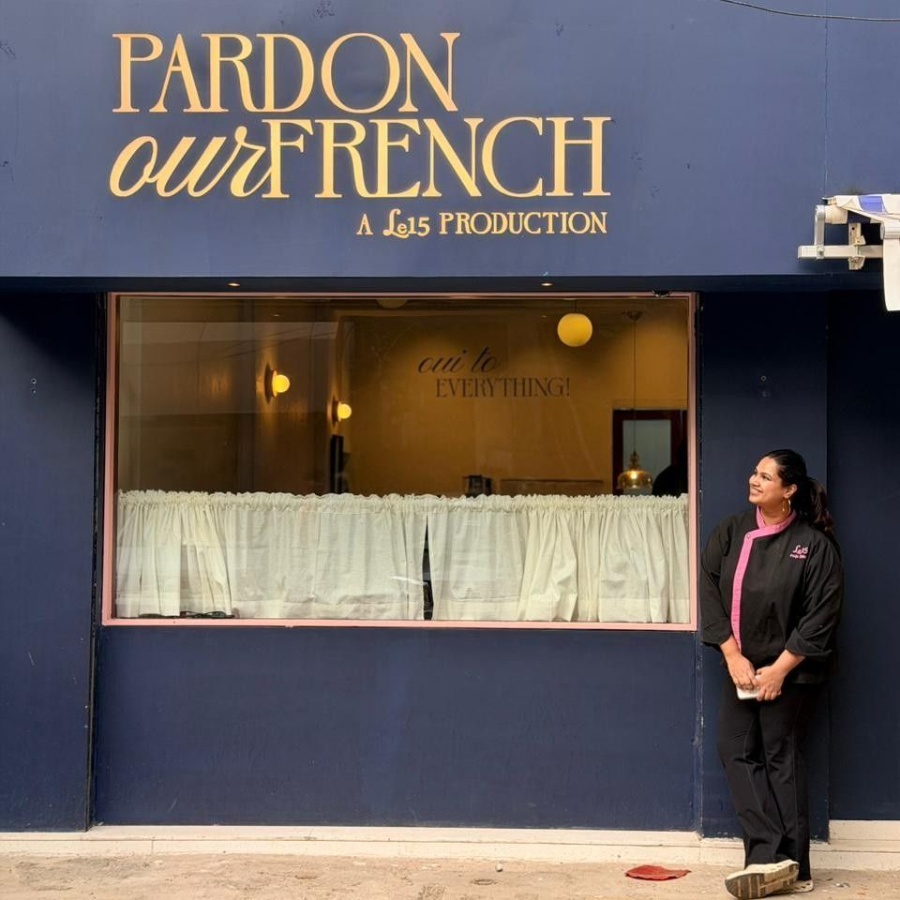By the age of nine, she had already begun teaching herself to cook, starting with Tarla Dalal’s well-thumbed The Pleasures of Vegetarian Cooking and Bipradas Mukhopadhyay’s beloved Pak Pranali series, which are staples in Marwari kitchens. Dalmia recalls her first creation was a macaroni dish with baked beans that she made using Amul cheese.
Briefly, she toyed with the idea of joining her father’s business. She would trail him to work, carrying his briefcase and imagining herself as his right-hand aide. By the time she was in 11th grade, she was fully immersed in the family’s marble business—travelling with him to source stone and purchase equipment. “I was never discouraged,” she recalls. “I was part of everything.”
Italy quickly became a second home. She travelled there four or five times a year, often spending time with a business associate in Liguria. “Serra Turgutcan was an extraordinary cook,” Dalmia recalls, adding that no dish captured her heart quite like spaghetti with tomato and basil. “The restaurant-hopping and the cooking sessions deepened my love for Italian cuisine and cemented it as the food I would dedicate my career to.”
Fresh off her teens, she opened MezzaLuna, one of Delhi’s first Italian restaurants, which she now admits was a “stupid gut decision”. Licenses? Leases? Paperwork? She didn’t bother. She simply opened the doors and started cooking. “I was flying to Italy every month and returning with suitcases full of ingredients because nothing was available here,” shares Dalmia. “People would look at the Parma ham and ask why it was cold. They wanted masala-pyaaz with their pasta.” In 1995, two years after it opened, MezzaLuna shut shop.
Instead of retreating, Dalmia decided to double down, this time in London, opening Vama, a contemporary Indian restaurant that became a favourite with the likes of Mick Jagger, Martina Navratilova, and Andrew Lloyd Webber. “MezzaLuna made me realise my love for food, but Vama taught me how to be professional,” she says. “I worked 14 to 16 hours a day, seven days a week, doing everything from wiping glasses to washing dishes to walking home in the cold because I couldn’t afford a cab.”
When she sold Vama and returned to Delhi in 1999, she was already a perfectionist with some hands-on experience. Diva opened in 2000, in what was then a quiet market where peacocks roamed. “This time, I was better prepared. I checked licenses, I took a space where I could afford rent, even if the restaurant didn’t work for a year. And by then, India had changed,” she says. “People were travelling, they were curious about food. Diva was lucky; it was the right place, the right time.”
These days, Dalmia is the sort of chef who can make even a basic potato look like the poshest potato you’ve ever had but without being pretentious. But the journey has been all-consuming. After years of dining in Italy, her approach to Italian cooking was deeply influenced by London’s River Café, where chefs Ruth Rogers and Rose Gray showed her the versatility of a wood-fired oven. In 1998, she watched them use it not just for their pizzas but also to cook meat, vegetables, and fish, much like a traditional tandoor. This lesson became a cornerstone of Diva from day one.
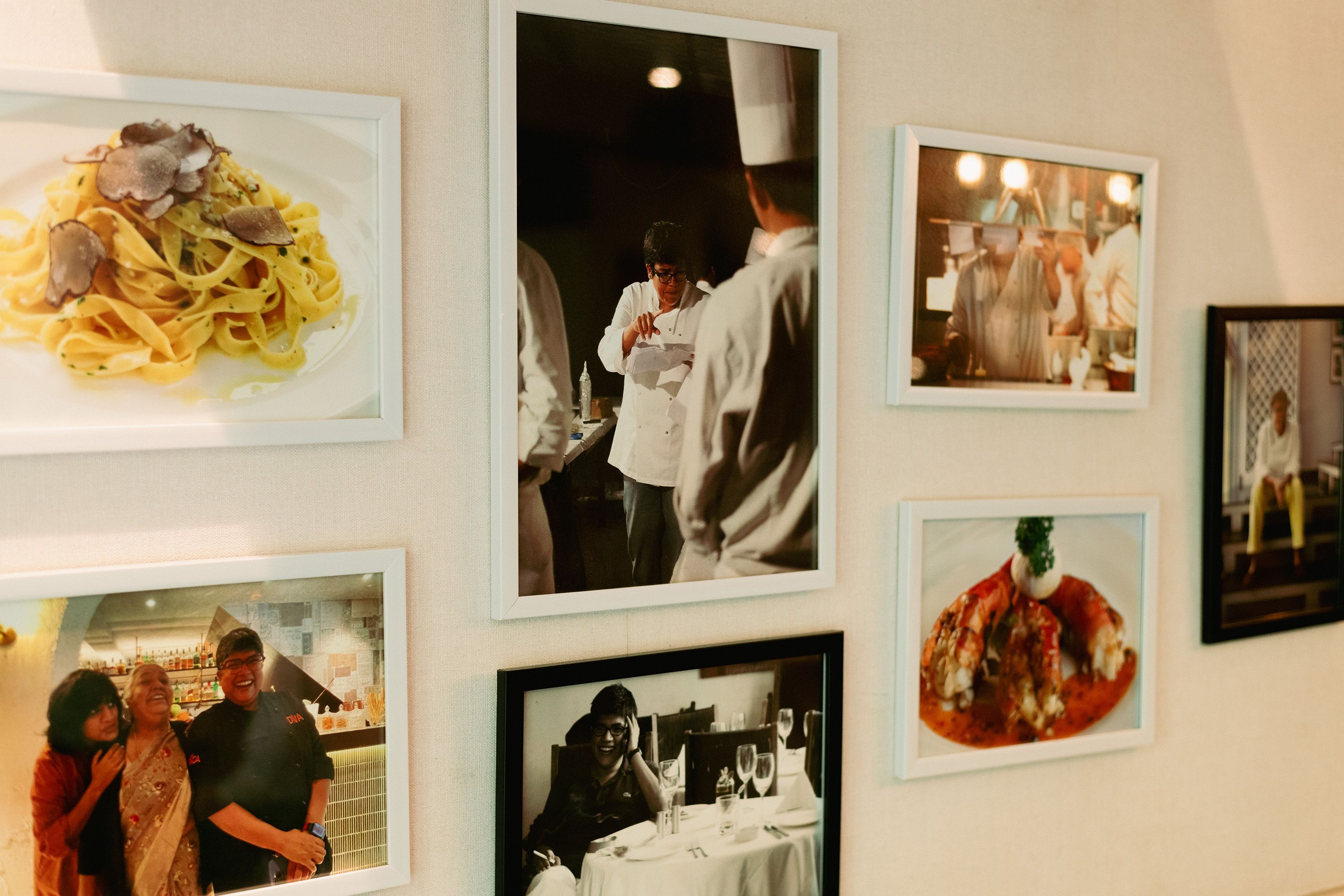
And yet, the early days were pure chaos: “I remember it was Holi, our very first year. Most of our staff was on leave, and I got a table of 22 people from some Ministry,” she remembers, pausing with a grin. “We were saying no to people, but these folks don’t take no [for an answer]. And I was alone in the kitchen. I cooked 146 dishes that night. I was destroyed. I still remember sitting on the steps outside, holding my head and howling like a baby.”
And that’s the thrill, as Carmy will make us believe—every day at a restaurant is a new high. “Boredom never creeps in. You’re always like, what the hell is going on?”
What began as a single restaurant became a culinary journey beyond borders, with Dalmia becoming the first chef to oversee the Italian Embassy’s restaurants worldwide. “Initially, Italian patrons were hesitant,” she recalls. “But once they tasted my food, they started asking why I do what I do—and why I’ve received recognition for it.”
In Delhi, she grew her footprint with Café Diva, Diva Piccola, and Diva Spiced (now shuttered), and a lasting partnership with Good Earth and Latitude 28. Today, she runs EatWell in Okhla and Diva at Max Towers (currently under rebranding) in Noida. In Mumbai, her journey moved from The Tasting Room in 2021 (since closed) to Motodo Pizzeria and most recently Diva at the Atrium in Jio World Plaza.
Her love for Italy, however, remains the same. If she began her journey by bringing honest Italian food to India, she is now introducing Italians to the flavours of the Indian subcontinent. In 2017, she launched Cittamani, in Milan, spotlighting bold yet delicate Indian flavours through locally sourced ingredients. Two years later, she partnered with chef Viviana Varese on Spica in Milan, later reborn as Polpo, a seafood restaurant that continues their association. Her global domination plan also includes Atrangi, which opened in 2021 in Dubai, to spotlight regional Indian cuisine. Beyond restaurants, her culinary influence now extends across the world through Diva Catering, which has orchestrated weddings in Puglia, milestone birthdays in St Moritz, and even served up magic for Larry Page’s famed Google Camp in Sicily.
This year is a milestone for Diva and Dalmia. To celebrate Diva’s 25-year mark, diners can sample a delicious time capsule in the form of an archival menu divided into three stages and spread over a couple of months. In August, there was the gorgonzola terrine and open ravioli from her early 2000s menu. This month, her experimental flans and asparagus pastas of the 2010s are on the menu. And in October, it will shift towards contemporary Italian plates.
There’s even a smattering of her other enterprises to taste. From Atrangi’s chola bhatura and pickled doodhi to Cittamani’s celeriac chaat, Sindhi-style fish, and Kashmiri baingan, and Motodo’s pizzas, it can all be savoured until October 31, ensuring there’s something for every palate during this milestone celebration.
For Dalmia, the story is deeply personal. And her restaurants reflect her values as much as her cooking. We may have met two years ago at a fleeting event, but she remembers me. “I never forget faces,” she says, like it’s her superpower. Her staff shares the same obsession. Ramesh Pandey, the manager at Diva, has been there 25 years and can recite guests’ orders from memory.
Dalmia runs a famously tight ship, down to a rule that if a guest is rude, the staff doesn’t have to go to that table. “This is our home. The people who come here are our personal guests. Mutual respect is non-negotiable.”
She’s equally direct about her place in a male-dominated industry. “I was always out… Everyone in my family knew. My friends knew. But that doesn’t mean I need to shout it from the rooftops,” says the LGBTQ activist who came out publicly to rally against Section 377. “I want to be known for the work I do, not my sexuality. I am a chef who happens to be a lesbian, not a lesbian chef,” she adds.
Today, she speaks to schools and children, helping those struggling with their identity. “The biggest challenge a gay person faces is often with themselves… accepting and realising it. If parents and peers support you, it makes life so much easier.”
Even IRL, she insists she follows instinct, not ambition. “People say I am ambitious, but I really am not. I was as content with one small restaurant as I am now. I just follow my heart. Today, my hunger is to spend more time in Goa with my partner and my animals,” says the chef who has helped set up the restaurant at Amaraanth, a 12-suite boutique hotel on Fatrade Beach.
Dalmia’s easy laugh punctuates our conversation. She’s generous with her stories, quick to make fun of herself, and clear about what matters. Shoes and eyewear, for instance. “I love shoes and glasses. They became my thing because my clothes never fit the way I wanted them to. My glasses are my security blanket. People keep telling me to get laser surgery, but never.”
If she weren’t a chef? “I’d be a librarian, so I could read all the books for free, or a DJ, because I love music. I’ve always made the playlists for my restaurants.”
As we wrap up, she glances at her watch, ready to head into the kitchen for Diva’s anniversary dinner. But not before serving one last witticism: “What can I say? I am a diva, honey. Maria Callas, Lata Mangeshkar, move aside. Ritu is coming.”







